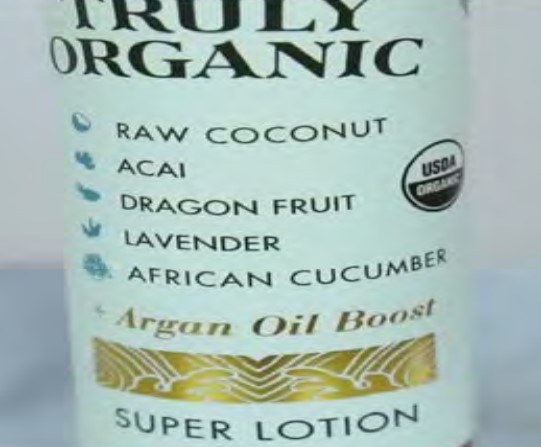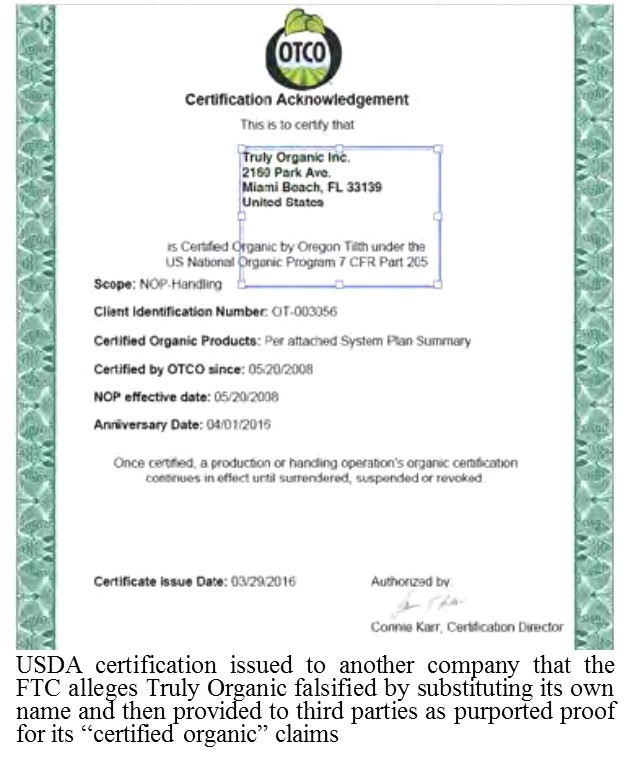Remember Saturday Night Live’s “Coffee Talk with Linda Richman”? When the host got verklempt, she suggested a paradoxical conversation starter – “The chickpea is neither a chick nor a pea,” “Rhode Island is neither a road nor an island,” “The Partridge Family is neither a partridge nor a family” – always ending with the catchphrase “Discuss amongst yourselves.” According to an FTC lawsuit, many of the personal care products a Miami company advertised as “certified organic” were neither certified nor organic. Let’s discuss amongst ourselves some salient compliance points.
 Truly Organic buys wholesale bath, beauty, and home products and then adds other ingredients. The company also resells pre-made “bath bombs” and soaps. Consumers can buy the products on the company’s website and at major department stores and retailers.
Truly Organic buys wholesale bath, beauty, and home products and then adds other ingredients. The company also resells pre-made “bath bombs” and soaps. Consumers can buy the products on the company’s website and at major department stores and retailers.
According to the complaint, the defendants represented that their products were wholly organic or certified organic in compliance with the United States Department of Agriculture’s National Organic Program, a federal program that enforces national standards for organically-produced agricultural products. Truly Organic hammered home the “organic” theme, describing its shampoos, lotions, baby products, etc., as “certified organic,” “100% organic,” “USDA organic,” and “USDA certified organic.” The company also said its products were “vegan.”
Despite those claims, much of what Truly Organic sold as “organic” contained ingredients that truly weren’t organic. In some cases, the defendants used non-organic ingredients – for example, non-organic lemon juice – when they could have sourced an organic version. Other products contained ingredients that USDA doesn’t allow in organic handling, including cocamidopropyl betaine and sodium cocosurfactant. Then there were Truly Organic’s bath bombs and soaps, which contained no organic ingredients at all. Indeed, none of Truly Organic’s products has ever been certified organic in compliance with the USDA National Organic Program. And certain products advertised as vegan contained non-vegan constituents like honey and lactose.
Some FTC complaints might end there, but Truly Organic’s conduct warrants closer attention. For example, on May 4, 2016 – that date will become important in a minute – the USDA notified the company that it had received complaints that Truly Organic “markets its product as organic in violation of the USDA organic regulations.” That same day, company president Maxx Appelman told USDA that “previous management” had erroneously used the USDA Organic seal, and that “we have removed the seal from all packaging, marketing/promotional materials, website, everything as you can see and are selling a completely redesigned group of products. We are well aware of the rules and regulations that govern the USDA Seal and have not used the seal whatsoever and do not plan to unless we gain proper certification.”
However, the very next day – May 5th – Appelman sent an email to a national retailer, claiming that “everything is certified organic (and actually the most organic in the world),” and “everything is vegan, made in the USA, cruelty free, fair trade, non gmo and gluten free.”
In the meantime, USDA took a closer look at the company’s claims and on June 16, 2016, issued a Notice of Warning confirming that Truly Organic “is not a certified organic operation, but represented its products as such on product labels and company website.” However, the USDA closed its investigation based on an understanding that the company had taken “action to discontinue representing [their] products as certified organic.”
 But even after USDA told Truly Organic that its products weren’t certified organic, the company continued its pattern of deception. According to the FTC:
But even after USDA told Truly Organic that its products weren’t certified organic, the company continued its pattern of deception. According to the FTC:
- Truly Organic falsified USDA certification by taking a document issued to another company, erasing that name, and adding its own. Truly Organic then provided the bogus certification to third parties as purported proof for its “certified organic” claims.
- Truly Organic gave product samples to marketers and online influencers that had labels featuring false certifications.
- Truly Organic uploaded to its YouTube channel videos from influencers continuing to make the false “certified organic,” “USDA organic,” and “vegan” claims.
- Truly Organic’s website continued to incorporate the statement “100% Organic Ingredients – Truly Organic” in its metadata. (That didn’t stop until FTC staff contacted the company in May 2019.)
In addition to a $1.7 million financial remedy, the settlement prohibits the defendants from misrepresenting that a product is wholly or partially organic, uses organic ingredients, is certified organic, is vegan, or has been evaluated by a third party. The order also covers any claim about the environmental or health benefits of the defendants’ products.
Feel free to keep discussing it amongst yourselves, but here are some compliance tips the case should suggest to other companies.
Exercise care with words that resonate with consumers. Don’t toss around terms like “organic” or “vegan” unless you’re on firm factual footing. You need solid proof before making highly material representations of that type. And as the complaint in this case shows, depending on the context, a brand name like “Truly Organic” can convey a claim, too.
Substantiate certifications. Products advertised as “organic” are credence goods. Because consumer have no way to evaluate the truth on their own, they put substantial stock in third-party certifications, especially a national program run by the Department of Agriculture. False representations about compliance are likely to land a company in legal hot water.
A word to the wise should be sufficient. When a government agency sends a “Notice of Warning,” a prudent company notices and considers itself warned. It’s bad business to make false representations to consumers and to the agencies charged with protecting them.
